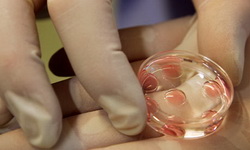If childbearing seems impossible at this point in your life, then IVF implantation must be worth your time and consideration.

IVF is a procedure undertaken by couples suffering from infertility problems. This procedure gives infertile couples the chance to conceive leading to a normal course of pregnancy. In addition, it helps in preventing the transfer of heritable diseases.
In an IVF process, a woman's egg cell is retrieved from her body and combined with the sperm cell of her partner and placed in a Petri dish for fertilization. After which, the embryos are transferred into the uterus. This part is called IVF implantation.
Things you should know about IVF Implantation
Candidates for IVF Implantation
Anyone can choose to undergo in-vitro fertilization procedure but this is awfully costly making it an expensive way to get pregnant. However, if you're suffering from tubal diseases or have history of ectopic pregnancies or botched standard embryo transfers; you are a strong candidate for IVF implantation.
The Procedure
The procedure is usually done in an office environment wherein specialized tubing with needlepoint and special fiber-optic scope are used. The implantation may take around 2 minutes.
Pros and Cons
You can actually see how the whole implantation procedure takes place through the video monitor. This reduces the likelihood of tubal pregnancy due to falsely releasing the embryos into the fallopian tube or dropping the embryo outside the uterus. However, there are chances of injuring the endometrium (lining of the uterus) which may prevent the pregnancy to push through.
How to increase your chances of a successful IVF Implantation?
Aside from following all the directives from you fertility doctors such as eating healthy and taking your medications and supplements, there are several things you can do to increase your chances of successful IVF implantation.
Avoid Stress
Stress is a menace to achieving successful pregnancy as it can badly affect your conception by initiating hormonal disruption. That is why you must be conscious of finding time to relax and take the initiative in managing daily stressful situations whenever possible.
Eat Pineapple
You may find this hard to believe but it's true. Pineapple contains bromelain, an enzyme which helps in breaking down proteins that prevent implantation. The enzyme also helps increase flow of blood to the uterus and reduces swelling as well. The core of the fruit has high concentration of this enzyme while its juicy flesh provides other healthful benefits. It is best to start eating a portion of pineapple daily after your embryo transfer; it will get into the healthy implantation by turning your cervical and vaginal mucus' PH levels acidic.
If possible, refrain from sex and manage your bowel movements properly
Although a greater number of doctors believe that sexual intercourse after the embryo transfer does not have an effect on a pregnancy, but an equal number of these medical practitioners believe that it is best to refrain from sex for at least two weeks. It is best to talk to your doctor about this matter. On the other hand, it is relatively normal to feel a little bit constipated as this is the result of your progesterone medication. Still, avoid straining your bowel movements. Although it does not directly affect IVF implantation, forcing your bowels can strain the nearby muscles of your uterus. To properly manage your bowel movements after embryo transfer, eat foods that are naturally rich in fiber and drink lots of water.
